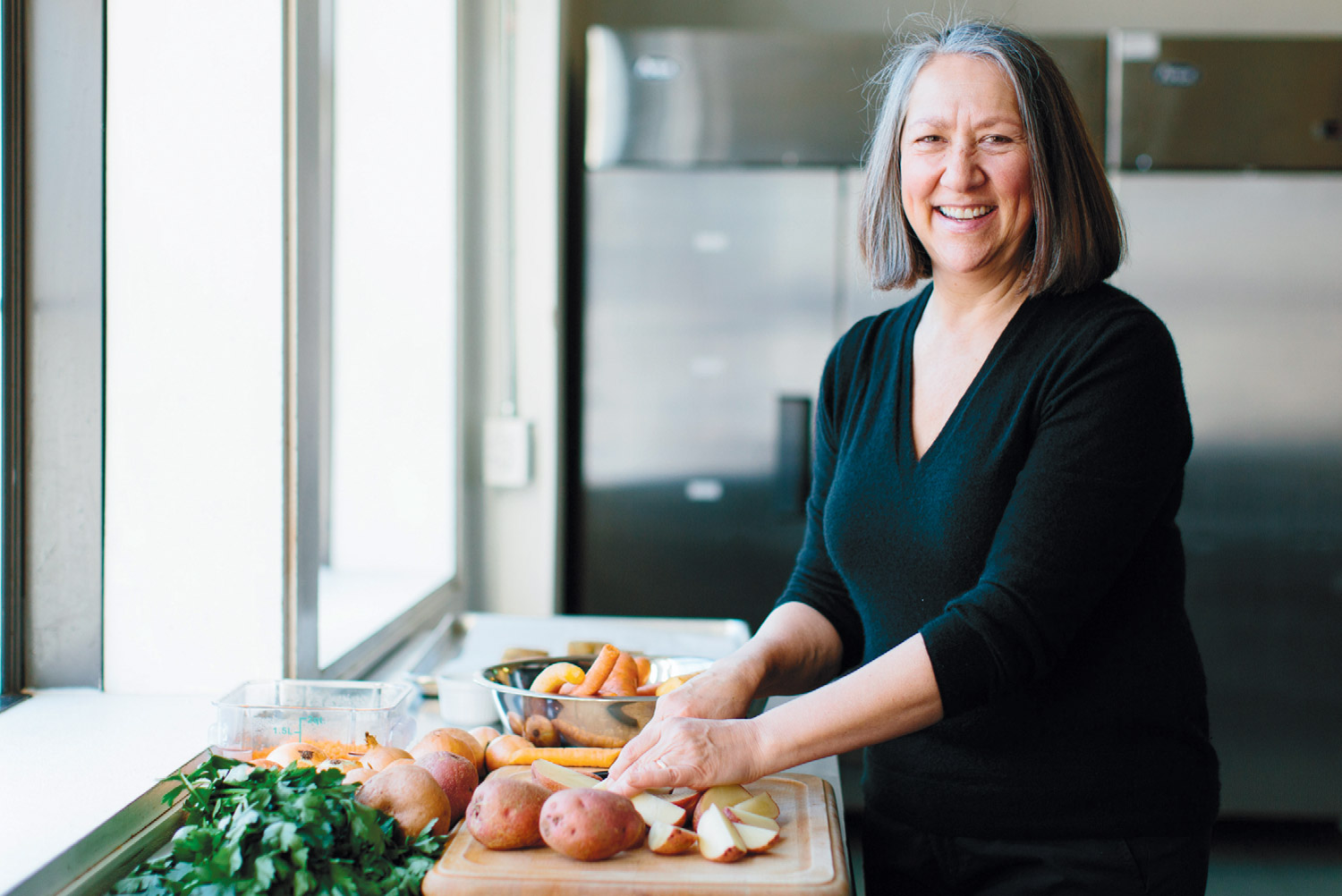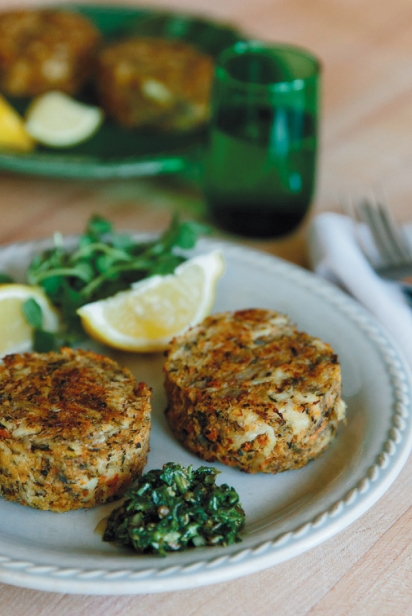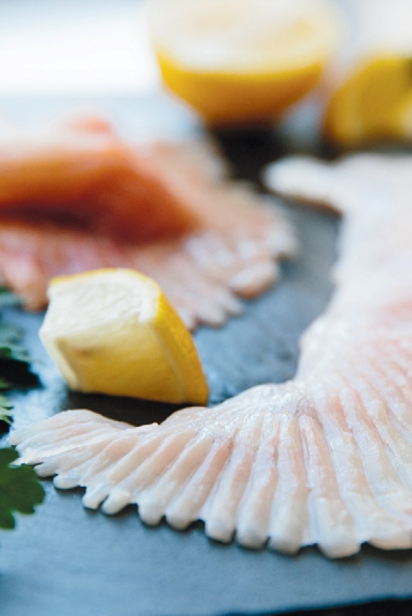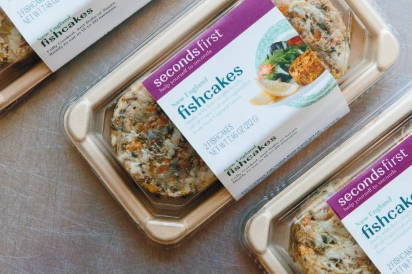Making Seconds Come First
Underloved Fish and Vegetables Take Their Place at the Table
The lack of healthy protein options for underserved populations and an overabundance of underutilized, locally landed fish and B-grade local produce (those misshapen veggies that are difficult to market) inspired Erika Lamb to create a food product that provides a source of high-quality protein while addressing a food distribution problem. She founded Seconds- First and developed a recipe for a mighty and tasty frozen fishcake made with fresh fish, fresh vegetables and her own special spice mix. She produces her fishcakes at Hope & Main, the food business incubator in Warren. Through SecondsFirst, Lamb aims to strengthen local economies while providing nutritious sources of protein to food insecure communities. We sat down with Lamb to learn more about what inspired her to serve a need in our community and how her unique business model has the potential to bring more people to the dinner table.
Edible Rhody: What was your inspiration for starting SecondsFirst?
Erika Lamb: I worked in urban agriculture for 15 years prior—everything from starting a schoolyard garden at my children’s school to, most recently, working with Food on the Move to bring local produce to low-income seniors. Before I established SecondsFirst, I conducted six months of research to see what was needed at senior communal meal sites, food pantries and other venues where food-insecure people shop for their food. There was a clear need for a frozen product, one that was high in protein and easy to prepare. There was also a need for something that was gluten-free, as many people suffer from gluten-driven metabolic diseases. When I found out about these factors, I asked myself, “How can we answer this problem of hunger and food insecurity within the state? And how can I help address these food-related health issues?”
Tell us about the Rhode Island fisheries and farmers you work with and how you established those relationships.
I’ll work with any farmer or fishery. I started by approaching the largest farms and discussed this idea. I said: “Let me tell you what I’m thinking about doing and you tell me if this is possible.” Now, I’m working mainly with five different farms. They are farms that most people know of in the area: Four Town Farm in Seekonk, Massachusetts, and Wishing Stone Farm and Young Family Farm, both in Little Compton, for example. These farms are large enough and grow enough that they have misshapen vegetables to sell year-round. Smaller farms often use their own ‘wonky’ vegetables for value-added products and may not want to sell them, but I would absolutely work with other local farms if they are interested.
In terms of fisheries, I buy fish that is already processed (fully cleaned and ready to cook). Currently, I am working with Foley Fish in New Bedford, Massachusetts, which is a fabulous fish company, but I’ll work with anyone who processes ‘underloved’ fish: local skate wing, Gulf of Maine pollock and other locally landed fish species.
What do you mean by “underloved” fish?
The more common terms are “underutilized” or “underappreciated” fish, but I call it “underloved.” If you look at skate, for example, 99% of it is exported, usually to Europe, and is often served as a delicacy with brown butter and capers. Even though skate wing is a local and abundant fish species, it is not readily accessible in grocery stores. Perhaps there is no marketing plan for it or, simply, it is lesser known. As a result, it has a lower monetary value despite its delicious taste and its status as a sustainable seafood option. SecondsFirst is assisting in rounding out the local economy by utilizing underloved fish from processors, giving them an extra revenue stream for fish that they wouldn’t necessarily be handling or selling otherwise.
Since starting SecondsFirst, what have you discovered about Rhode Island and its vibrant food and agriculture community?
That things are really interconnected here— we have the advantage of being in a place where a farm might be five miles away and a fish processor might be 20 miles’ distance, so it is very easy to gain access to our local products. At the beginning of the Seconds- First research and development phase, I spoke to a strawberry farmer in Michigan who was trying to make preserves with local strawberries. It wasn’t uncommon for her to travel five hours to a farm to get additional strawberries to bring them back for preparation at a local community kitchen. I’ve discovered that people and businesses in Rhode Island are very willing to introduce community members to new farms and fisheries. I make the fishcakes within 25 miles of the local farms and the fish processor I’m currently working with. There’s a really nice thing about the fact that, when we say “local” in Rhode Island, we really mean local!
Tell me about the population you hope to reach with your product.
I feel very strongly that healthy food is a human right—that all people should have access to healthy food at an affordable price. Those of us who are getting food from a food pantry, one in eight of us here in Rhode Island, should have options of minimally processed food made from sustainably and locally sourced ingredients.
Can you speak a bit about your fishcakes, their ingredients and method of production?
The fishcakes are really simple—very similar to what many of our grandmothers made. We tested many recipes and invited chef tasters to give us feedback before we finalized the current fishcake recipe.
They have seven ingredients but the essential ingredients are: fresh fish, fresh vegetables, spices and soy protein to bind them together. We sauté the fish and vegetables in olive oil—this is a minimally processed and hand-made product. We make and freeze the fishcakes so they are fully cooked and only need to be heated on a stovetop or in an oven until they are lightly browned.
Why was it important to you to make the fishcakes dairy-, wheat- and egg-free?
When I conducted research, I spoke to people who were eating their one hot meal a day in a senior congregate meal site, food bank, shelter or hospital setting. I learned that many people need products that are gluten-free. I wanted to make a product that was accessible to and could be enjoyed by all.
What is the plan for distribution? Do you have hopes to increase production and expand beyond the state?
The plan for distribution is a bit different than a typical business model. We utilize a “Robin Hood model,” whereby we sell fishcakes at a higher price to retail markets, universities and colleges to subsidize a discounted- priced fishcake for food-insecure populations.
We’ve just entered the retail market. SecondsFirst fishcakes are available at select Dave’s Marketplace locations. The University of Rhode Island is very interested in expanding its local procurement and is offering SecondsFirst fishcakes in its dining hall this spring as a healthy, gluten-free seafood option that’s also a local product. As long as I have buyers like the University of Rhode Island, I can offer the fishcakes to organizations serving the food insecure like the Jonnycake Center of Peace Dale and the Daily Table in Boston.
What are the future goals for SecondsFirst?
I would like to increase distribution so that we are selling many more fishcakes per month. This would allow us to put more people to work in the Hope & Main kitchen—employing those entering the workforce is another social initiative of SecondsFirst.
Next, it would be to expand the product line. There are many other seasonal vegetables, like squash, that can be used in the fishcakes. We have already started looking at changing the spice blends and flavor profiles. We’re having Sanctuary Herbs of Providence grow our spice blend—they partner with refugee and immigrant farmers, so this is a terrific opportunity for us to support a local source for herbs and spices. We’re also looking at using natural binders other than soy to accommodate those with soy allergies. So, as of right now, I think seasonal produce and other product variations, all using underutilized fish and wonky vegetables, is the way of the future for SecondsFirst!
For more information, visit SecondsFirst.com.








